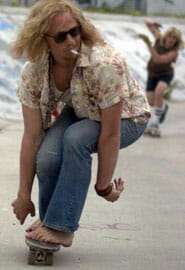Lords of Dogtown

(photo: Heath Ledger as skater Skip Engblom)
In the early 1970s a scruffy, surf-bedraggled group of misfits took a simple toy, and—against the backdrop of decrepit, forsaken Venice, Calif.—planted the seeds for the sport of skateboarding as we know it. They were the subject of the award-winning documentary Dogtown and Z-boys, which was filmed and written by one of their own: Stacy Peralta (later known for discovering superstar Tony Hawk and the rest of the Bones Brigade skate team, and co-owning the skateboard company Powell-Peralta).
In the concrete wake of the success of Z-boys, a tableau celebrating their poetic, primordial skateboarding style, production began on a Hollywood feature portraying this ebullient band of California scofflaws. First Fred Durst of Limp Bizkit was to direct (whew). Then David Fincher (Panic Room) backed out after production disagreements (he wanted real skateboarders instead of actors with skate training, and a $70 million budget). Luckily, Peralta (now the screenwriter) had seen the bold, hyper-kinetic teen drama Thirteen, and director Catherine Hardwicke was enlisted. Not only did she reinvigorate the sagging, demoralized production, but she did her best to repair a flat, all-testosterone script, as well. Finally, Lords of Dogtown came to fruition.
The result is a fictional portrayal of the Dogtown years in all its lava-lamp- and-1970s-gritty-guitar-rock glory. It’s a glimpse into a salt-crusted, sunny world where dads lone their surfboards to their sons, where moms wear dirty Jethro Tull T-shirts, and new Polyeurethane skateboard wheels are surreptitiously treated like nefarious contraband. We learn that up until now, “skateboarding” was treated by the masses as a fad, and that the “competitions” were comparable to campy, childish magic shows that feature balancing and headstands, and the riders might as well be doing tricks with full-body yo-yos. The attitude and fury we Mountain Dew drinkers equate with the sport was non-existent.
Enter badass nucleus of protagonists: Stacy Peralta, Jay Adams and Tony Alva (to Jimi Hendrix’s “Voodoo Child (Slight Return).” Then Allman Brothers, Ted Nugent et al—constant reminders that, hey, it’s the ’70s!)
First there’s Peralta, who’s portrayed by the likeable but stiff John Robinson (Elephant). He’s the do-gooder “straight” character, whose cascading blond locks might as well be a crewcut in his peers’ eyes, because he has a summer job at a pizza restaurant, drives a car and (gasp!) wears a watch. Innocence radiates from Robinson’s smooth, boyish face. Ultimately, he’s the responsible one. Next is the taciturn, brooding Jay Adams (Emile Hirsche, Girl Next Door). Adams is a skateboarding prodigy, but he’s volatile and boils with angst; Hirche plays the part less like a human being and more like a chimpanzee. Jay’s anger is fueled by his father’s leaving, and he’s forced to fend for his estranged mother (Rebecca DeMornay). Last is Tony Alva (Victor Rasuk, Raising Victor Vargas). Alva is the ego, the hirsute, cocksure Hispanic who has the skating chops and the mouth to boot, an early skateboarding Cassius Clay. It’s Alva’s intention to take over the world, one skate-park at a time.
Team Peralta/Hardwicke has set up the pieces: a Peralta vs. Alva skating rivalry, while Adams spirals out of control (far too carefree to ever put on a ridiculous, opalescent jersey and get “in the game”).
-

-

-

-

-

-

-

-

-

-

-

-

-

-

-

-

-

-

-

-

-

-

-

-

-

-

-

-

-

-

-

-

-

-

-

-

-

-

-

-








































